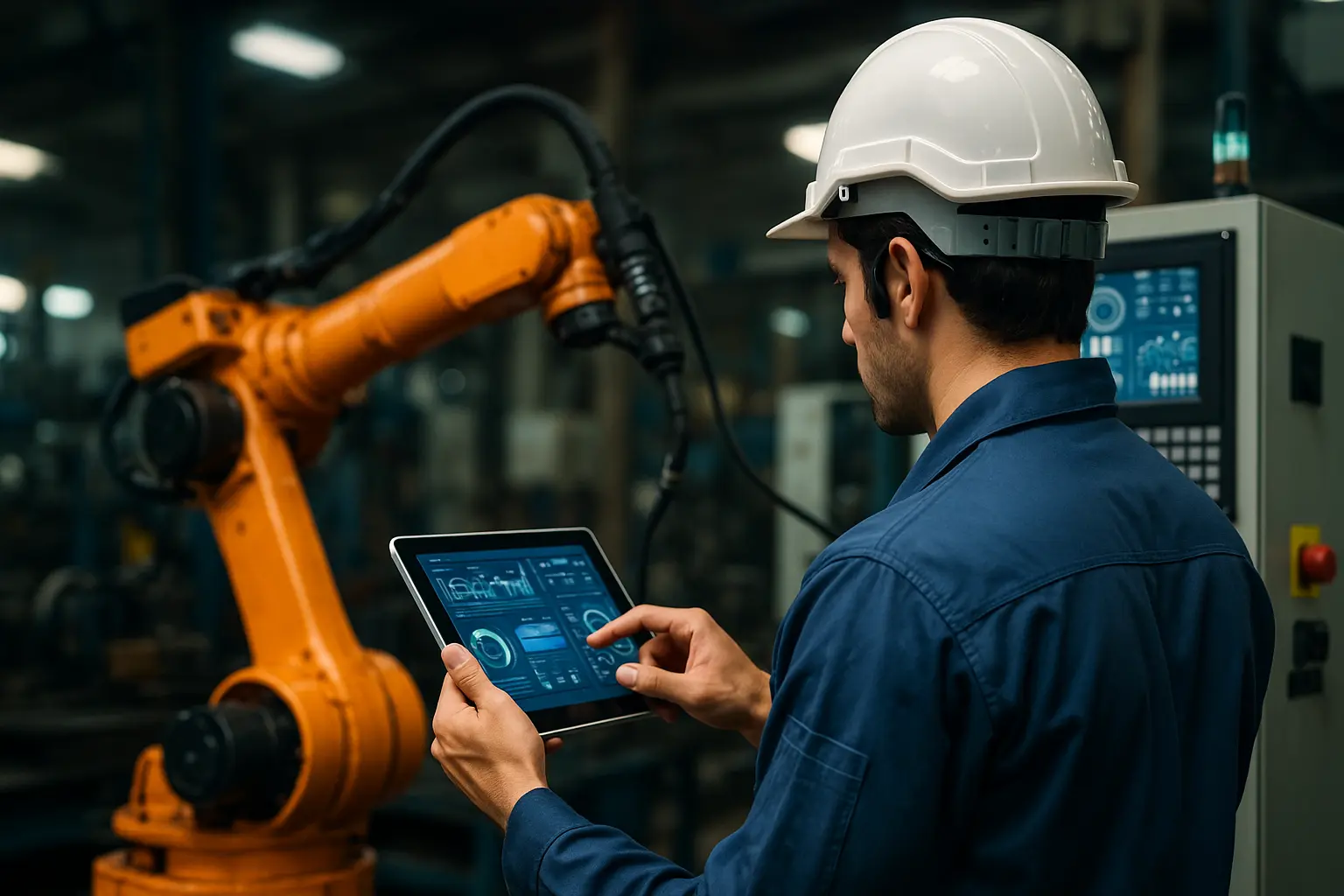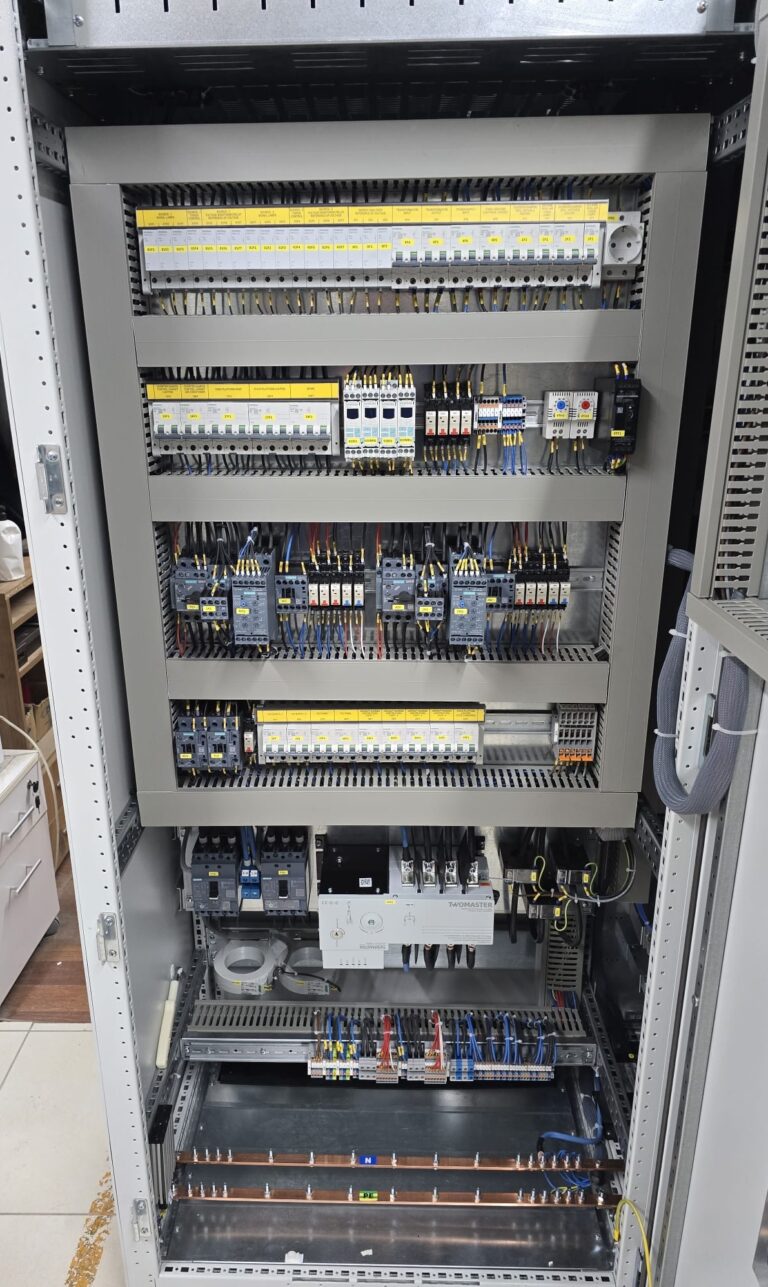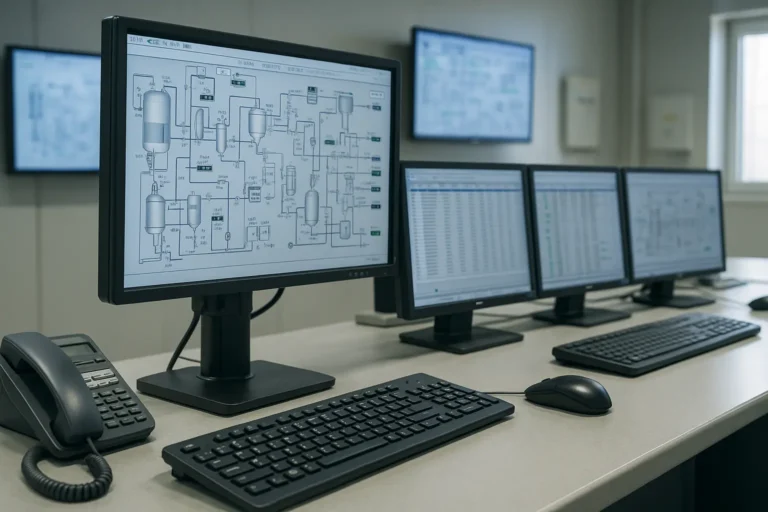What is an MCC Panel? What are its Features?
An MCC panel (Motor Control Center) is an essential electrical distribution system used in industrial facilities to control and manage...
Devamını Oku

Factory automation systems refer to the integration of technology, software, and machinery to control industrial processes with minimal human intervention. These systems aim to improve productivity, consistency, and operational safety in manufacturing environments. By automating repetitive and rule-based tasks, companies can reduce errors, increase output, and optimize resource utilization. These systems work through a network of sensors, controllers, and actuators that interact in real-time to execute precise operations on the production line.
At the core of these systems lies the communication between hardware and software. Sensors collect data from the physical environment, which is then processed by programmable logic controllers (PLCs). Based on pre-set instructions, these controllers activate actuators to perform specific tasks. Monitoring and supervision are managed by SCADA and HMI systems, which provide real-time insights and allow operators to intervene when needed. Additionally, PLC programming allows these systems to be customized for different production needs, ensuring flexibility and scalability. Whether for large-scale industrial plants or smaller facilities, factory automation systems offer a smart pathway toward digital transformation and operational excellence.
Factory automation is the use of control systems such as computers, robots, and information technologies to handle different processes and machinery within a manufacturing environment. Its primary goal is to reduce human intervention in repetitive tasks, enhance production efficiency, and minimize operational errors. These systems play a critical role in ensuring consistent product quality while also improving worker safety and reducing labor costs. Through the strategic use of sensors, controllers, and software, factory automation creates a streamlined workflow from raw material input to finished product output.
Modern factory automation systems can range from simple assembly line automation to fully integrated smart manufacturing solutions. Technologies like PLC programming enable real-time decision-making and operational adjustments based on live data collected from the production floor. As industries move towards digital transformation, automation not only increases productivity but also facilitates predictive maintenance and energy efficiency. Companies like Adatech specialize in designing tailored automation solutions to meet specific industry needs, whether for discrete manufacturing or process industries.
There are several types of factory automation systems, each designed to meet different production needs and levels of flexibility. The four main categories include fixed automation, programmable automation, flexible automation, and integrated automation. Fixed automation is used in high-volume, repetitive manufacturing environments where the equipment setup is dedicated to a specific task. This type offers high throughput but low adaptability. Programmable automation, on the other hand, allows for reprogramming of control systems to accommodate different products or variations in the production process.
Flexible automation builds on this by enabling quick changeovers between different tasks with minimal downtime, making it ideal for batch production and customized products. Finally, integrated automation systems connect all elements of production—machines, software, data systems—into a unified network. With integrated systems, manufacturers can achieve centralized control through platforms like SCADA, allowing for real-time monitoring and coordinated operations. Adatech engineers analyze each client’s unique operational demands to design and implement the most suitable automation type for maximum efficiency and scalability.
Effective factory automation relies on a combination of hardware, software, and communication technologies that work together seamlessly. The core components include sensors, actuators, PLC (Programmable Logic Controllers), SCADA and HMI (Human-Machine Interface) systems, and data acquisition software. Sensors collect real-time information from the production floor—such as temperature, pressure, position, or speed—which is then transmitted to PLCs for processing. Based on the programmed logic, PLCs send signals to actuators, which perform physical actions like opening valves, starting motors, or stopping conveyors.
SCADA and HMI systems provide operators with a centralized interface to monitor and control operations. These tools not only visualize data but also allow manual overrides when necessary. Meanwhile, data acquisition and monitoring software records every detail from the production process, helping with performance analysis, fault detection, and predictive maintenance. Adatech designs end-to-end factory automation systems that integrate all these components into a cohesive infrastructure, ensuring high efficiency, flexibility, and reliability for industrial operations.
Sensors and actuators are the physical foundation of factory automation systems. Sensors detect environmental or mechanical conditions—such as temperature, pressure, motion, and proximity—and convert these into electrical signals. These signals are sent to control devices like PLCs, which interpret them and decide the next action. For example, a proximity sensor might detect an item on a conveyor belt, prompting the system to trigger a robot arm or stop the belt.
Actuators do the mechanical work. Based on commands received from the controller, actuators activate movements such as rotating a motor, pressing a pneumatic arm, or opening a valve. Together, sensors and actuators enable real-time, precise responses in automated systems. When chosen and calibrated correctly, they improve efficiency, accuracy, and safety in production processes. Adatech utilizes advanced sensor-actuator pairings tailored to each client’s operation, ensuring optimal functionality across all automation stages.
PLC (Programmable Logic Controllers) are the brain of many factory automation setups. These industrial computers are designed to receive data from sensors, make decisions based on pre-programmed logic, and control actuators or other machinery accordingly. Their primary function is to ensure that operations follow precise, repeatable sequences. PLCs are highly reliable, operate in harsh environments, and offer real-time control over complex processes.
PLC programming allows engineers to customize logic sequences for specific tasks, enabling flexible responses to changing conditions in the production line. For instance, a PLC can monitor multiple inputs simultaneously—such as temperature, speed, or pressure—and adjust the system automatically if any parameter exceeds safe limits. Adatech delivers advanced PLC programming solutions that are tailored to the needs of various industries, ensuring performance, safety, and scalability.
SCADA (Supervisory Control and Data Acquisition) and HMI (Human-Machine Interface) systems serve as the control and visualization layer of factory automation systems. SCADA platforms collect data from various parts of the production environment and present it in an organized, real-time dashboard. Operators can monitor equipment status, receive alerts, and make remote adjustments, ensuring uninterrupted workflow. These systems are essential for large-scale or multi-location operations where centralized control is needed.
HMI systems, on the other hand, offer a user-friendly interface that connects human operators with machines. Touchscreen panels or PC-based displays allow operators to issue commands, view process animations, and respond to errors promptly. Together, SCADA and HMI enhance visibility, control, and efficiency in automated systems. Adatech specializes in implementing both SCADA and HMI technologies to deliver intelligent and responsive automation environments.
Data acquisition and monitoring software plays a critical role in the efficiency and intelligence of factory automation systems. These software tools continuously gather operational data—such as cycle times, energy consumption, and error logs—from various system components. This information is then analyzed to identify patterns, predict failures, and optimize processes. Real-time monitoring also enables quick responses to anomalies, minimizing downtime and maximizing throughput.
By integrating this software with PLCs, SCADA, and cloud platforms, manufacturers gain full visibility into every layer of the production environment. It also supports long-term data storage for compliance and performance audits. Adatech develops custom monitoring solutions that align with clients’ specific workflows, empowering decision-makers with the insights needed to boost productivity and quality.
Factory automation offers a wide range of benefits that drive productivity, quality, and operational efficiency across industries. One of the most significant advantages is consistency—automated systems ensure that each product is manufactured to the same standard with minimal variation. In addition, automation reduces human error, increases production speed, and allows for round-the-clock operation, which boosts overall output and profitability.
Another major advantage is predictive maintenance. With real-time data collected by sensors and monitoring software, businesses can anticipate equipment failures and schedule maintenance before costly breakdowns occur. Unmanned factory automation also becomes achievable by integrating technologies like SCADA and PLC programming, enabling fully autonomous production lines. Companies like Adatech design scalable automation solutions that optimize resource usage, improve safety, and offer actionable insights for long-term strategic planning.
The time required to implement factory automation systems varies depending on the complexity of the production process, the size of the facility, and the level of integration desired. A basic setup may take a few weeks, while a fully integrated smart factory can take several months. At Adatech, each project begins with a detailed assessment to ensure timely and efficient deployment with minimal disruption to operations.
Yes, unmanned factory automation is technologically achievable. Through a combination of PLC programming, advanced robotics, and SCADA systems, it’s possible to design a factory that operates 24/7 without human intervention. However, the feasibility depends on factors like industry type, safety regulations, and initial investment. Adatech provides fully autonomous automation solutions tailored to specific business models.
Factory automation isn’t just for large enterprises. Small and medium-sized manufacturers can adopt scalable and cost-effective automation solutions to improve product quality, reduce waste, and streamline operations. Modular systems allow smaller facilities to automate key processes gradually, reducing manual labor and improving output efficiency.
Maintenance in automated environments is driven by data. Sensors and monitoring tools continuously track the condition of machinery and system components. When abnormal patterns are detected, alerts are triggered, enabling preventive action. This predictive maintenance approach reduces downtime and extends equipment lifespan. Adatech integrates smart monitoring software into its solutions to support proactive maintenance strategies

An MCC panel (Motor Control Center) is an essential electrical distribution system used in industrial facilities to control and manage...
Devamını Oku
Lightning is a natural phenomenon that poses serious risks to buildings, electrical systems, and human safety. A single lightning strike...
Devamını Oku
Industrial control systems are integrated technology structures that automate, monitor, and manage industrial operations. These systems play a crucial role...
Devamını OkuPROTECTION OF PERSONAL DATA
WEBSITE COOKIE POLICY
Your personal data; It is one of the leading principles of our Organization to protect the privacy of visitors to the website (www.adatech.com.tr) operated by ADATECH as the data controller. This Cookie Usage Policy (“Policy”) explains to all our website visitors and users which types of cookies are used and under what conditions.
Cookies are small text files stored on your device or network server by websites you visit on your computer or mobile device.
They are generally used to provide you with a personalized experience during your use of the website you visit, to improve the services offered and to improve your experience, and may contribute to ease of use while browsing a website. If you do not prefer the use of Cookies, you can delete or block Cookies in your browser settings. However, we would like to remind you that this may affect your use of our website. Unless you change your cookie settings in your browser, we will assume that you accept the use of cookies on this website.
1. WHAT KIND OF DATA IS PROCESSED IN COOKIES?
Cookies on websites, depending on their type, collect data about your browsing and usage preferences on the device you visit the site. This data includes information about the pages you access, the services and products you review, your preferred language option and other preferences.
2. WHAT is a solution and what are its intended uses?
Cookies are small text files that are stored on your device or network server through browsers by websites you visit. These small text files, which contain your preferred language and other settings on the site, help us remember your preferences the next time you visit the site and make improvements to our services to improve your experience on the site. Thus, you can have a better and personalized usage experience on your next visit.
The main purposes of using cookies on our Website are listed below:
3.TYPES OF COOKIES USED ON OUR WEBSITE
3.1. Oturum Çerezleri
Session cookies ensure that the website functions properly during your visit. They are used for purposes such as ensuring the security and continuity of our sites and you during your visit. Session cookies are temporary cookies, they are deleted when you close your browser and come to our site again, they are not permanent.
3.2. Persistent Cookies
These types of cookies are used to remember your preferences and are stored on your device via browsers. Persistent cookies remain stored even after you close your browser or restart your computer from which you visited our site. These cookies are kept in subfolders of your browser until they are deleted through your browser’s settings.
Some types of persistent cookies may be used to provide you with special suggestions, taking into account issues such as your purpose of using the Website.
Thanks to persistent cookies, if you visit our Website again with the same device, it is checked whether there is a cookie created by our Website on your device and if there is, it is understood that you have visited the site before and the content to be transmitted to you is determined accordingly and thus a better service is provided to you.
3.3. Mandatory/Technical Cookies
These cookies are essential for the website you visit to function properly. The purpose of such cookies is to provide necessary services by enabling the website to function. For example, it allows you to access secure parts of the website, to use its features, to navigate on it.
3.4. Analytical Cookies
They collect information about the way the website is used, the frequency and number of visits, and show how visitors navigate to the site. The purpose of using such cookies is to increase performance by improving the way the site functions and to determine the general trend direction. They do not contain data that could enable the identification of visitors. For example, they show the number of error messages displayed or the most visited pages.
3.5. Functional/Functional Cookies
It saves the choices made by the visitor within the site and remembers them on the next visit. The purpose of such cookies is to provide ease of use to visitors. For example, it prevents the site user from re-entering the user password on each page they visit.
3.6. Targeting/Advertising Cookies
They enable the measurement of the effectiveness of advertisements served to visitors and the calculation of the number of times the advertisements are viewed. The purpose of such cookies is to serve ads customized to the interests of visitors.
Likewise, they enable the detection of visitors’ interests specific to their browsing and the presentation of appropriate content. For example, it prevents the advertisement shown to the visitor from being shown again in a short time.
4. HOW TO MANAGE COOKIE PREFERENCES?
To change your preferences regarding the use of cookies or to block or delete cookies, simply change your browser settings.
Many browsers give you the option to accept or reject cookies, accept only certain types of cookies, or be alerted by the browser when a website requests to store cookies on your device so that you can control cookies.
It is also possible to delete cookies previously saved in your browser.
If you disable or refuse cookies, you may need to set some preferences manually, some features and services on the website may not function properly as we will not be able to recognize and associate your account. You can change the settings of your browser by clicking on the relevant link from the table below.
5. ENFORCEMENT OF WEBSITE PRIVACY POLICY
Website Privacy Policy …./…./…./…. . is dated. In case all or certain articles of the Policy are renewed, the effective date of the Policy will be updated. The Privacy Policy is published on the website of the Authority (www.adatech.com.tr) and made available to the relevant persons upon the request of the personal data owners.
ADATECH
Address: Esenyalı Neighborhood Yanyol Street Varyap Plaza No:61-148 Pendik / Istanbul
Telephone: +90 (216 ) 514 80 69
E-mail: [email protected]
Web Address: www.adatech.com.tr